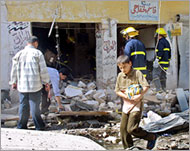Pressure on al-Jaafari increases
Iraq’s president, Jalal Talabani, has stepped up pressure on the prime minister, saying that opposing his nomination for a second term was a matter of national unity.
Ibrahim al-Jaafari, leader of the Dawa party and prime minister for the past year, won the nomination to lead the new government in a narrow internal ballot of Alliance legislation last month
But he was selected by only one vote, clearly showing a division within the alliance as many voted for Adel Abdel Mahdi, the vice-president, to replace him.
Jaafari faces strong opposition from the Kurdish group which has 53 seats in the new 275-seat parliament, the Sunni group – National Concord Front – which has 44 seats and the list of Iyad Allawi, the former prime minister who controls 25 seats.
The Shia alliance is the largest block with 128 seats.
The Iraqi president’s opposition to al-Jaafari surfaced after a meeting with General John Abizaid, the head of US Central Command, to discuss security after 10 days of sectarian bloodshed in which hundreds have been killed.
Consensus wanted
|
“With all our respect to Dr al-Jaafari, we asked them [Shia Alliance] to choose a candidate who is unanimously agreed upon by Iraqis” Jalal Talabani, Iraqi president |
Talabani said: “With all our respect to Dr al-Jaafari, we asked them [Shia Alliance] to choose a candidate who is unanimously agreed upon by Iraqis.”
Sunnis and Kurdish politicians “want to be real partners in the coming government and not ministers without opinion. They want Iraq to be ruled through a partnership where everyone participates”.
“I want to be clear, it is not against Dr al-Jaafari as a person. He has been my friend for 25 years. What we want is consensus,” Talabani said.
Iraq’s ruling Shia Alliance is under growing pressure from potential partners to ditch al-Jaafari as their price for joining a government of national unity that the US hopes would help end violence and allow it to withdraw troops.
|
|
Ineffective
 |
|
The president called on Sunni |
The prime minister’s critics say he has failed to stop violence and improve the economy.
Many Iraqis, primarily Sunnis, blame al-Jaafari for failing to rein in Shia militiamen who swarmed out of Baghdad’s Sadr City slum on 22 February and launched retaliatory attacks against Sunni mosques and clerics after the bombing of a Shia shrine in Samara.
Sunnis also blame al-Jaafari for failing to control the Shia-led interior ministry, which is alleged to have committed widespread human-rights abuses.
Kurdish claims
|
“We call on all the sons of Iraq not linked to Zarqawi to understand the danger posed by communal violence” Jalal Talabani, |
Kurds are angry at al-Jaafari because they believe that he is holding up the resolution of their claims to control of the oil-rich city of Kirkuk.
An official close to Kurdish leadership told The Associated Press on Saturday that Talabani’s true anger arose out of al-Jaafari’s visit last week to Turkey.
The official said Talabani had learnt that al-Jaafari promised the Turks to stand against including Kirkuk in the proposed Kurdish federal region. The official spoke on condition of anonymity because of the sensitivity of the dispute.
The Turks, who fear that greater Kurdish autonomy in Iraq could inspire rebellious Kurds inside Turkey to seek their own homeland, reportedly promised, as a quid pro quo, to help al-Jaafari improve relations with the Americans, the official said.
Turkish views
Iraqi Turkmen have strong ethnic ties to Turkey, and Ankara reportedly urged al-Jaafari to ensure that ethnic Turks would have a strong say in running Kirkuk. Al-Jaafari reportedly expressed sympathy with Turkish views.
Officials in al-Jaafari’s office were not available for comment.
US officials are involved in trying to form the government and have privately expressed reservations about al-Jaafari’s close ties to fellow Shia Islamists in Iran.
Appeal to Sunnis
Meanwhile, Talabani has announced that parliament will soon hold its first session since elections in December in an effort to form a government of national unity.
“A government of national unity can help improve security and stability in Iraq,” Talabani said.
He appealed to Sunni Arab fighters not linked to al-Qaida frontman Abu Musab al-Zarqawi to lay down their arms.
“We call on all the sons of Iraq not linked to Zarqawi to understand the danger posed by communal violence. It is in the interest of Sunni Arabs to put an end to their armed operations,” Talabani said.